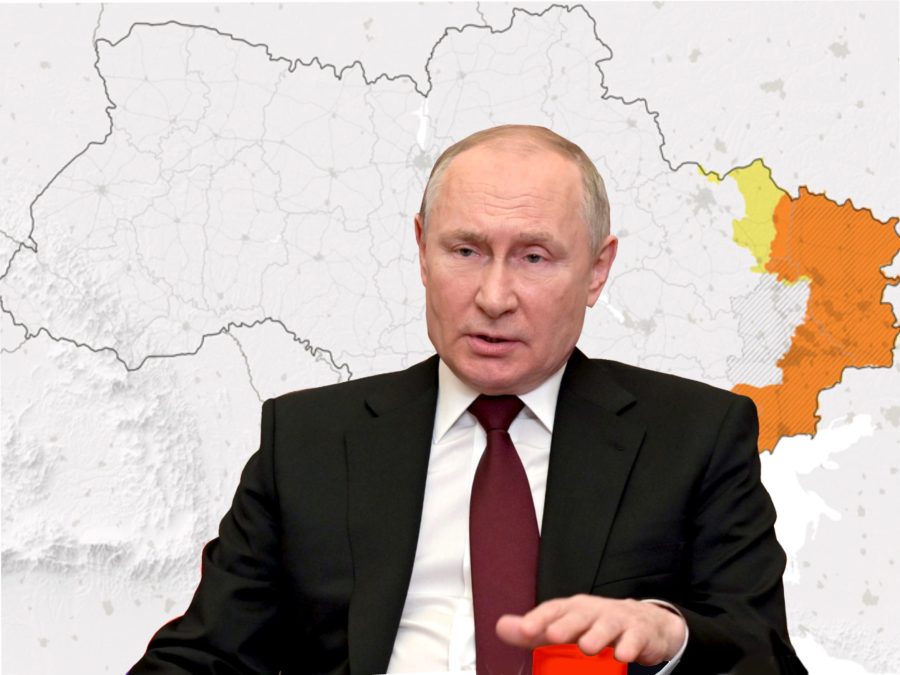How the West Should Respond to Putin’s Nuclear Threats
In the event of a nuclear attack against Ukraine, the West must be willing to militarily intervene
October 18, 2022
On September 21, Russian dictator Vladimir Putin issued a threat to the world: if Russia’s territorial integrity is to be compromised, he will resort to nuclear weapons. At the same time, Russia also backed “referendums” in parts of Russian-occupied Ukraine–Luhansk, Donetsk, Kherson, and Zaporizhzhia–for formal annexation. By officially making sections of Ukraine Russia, Putin is signaling his intentions to use nuclear weapons if Ukraine attempts to liberate those territories.
In response, the United States and its NATO allies must signal that such a nuclear strike will be met with direct and decisive military intervention to assist Ukraine’s liberation.
For the past 80 years, the world has been governed by particular norms designed to maintain peace and promote prosperity. One of the most fundamental norms underlying our post-World War II international order is that warfare for the sake of seizing territory is unacceptable. This norm was cemented during the Allied victory against the Axis powers and reinforced through Kuwait’s liberations in 1991.
However, the war in Ukraine has introduced another variable: nuclear weapons. Allowing Russia to gain a military advantage using nuclear weapons without significant additional recourse would signal to aspiring autocrats and revisionist states across the globe that the use of nuclear weapons is an effective way to realize their revisionist ambitions.
The second use of nuclear weapons would open up a Pandora’s Box the world has never encountered before. Perhaps Chinese wargamers and policymakers would be under the impression that using nuclear weapons would be an acceptable option in Taiwan after already being met with heavy sanctions. Simply continuing sanctions and weapons deliveries after a Russian nuclear strike would signal to the world that there is little marginal cost in using nuclear weapons against adversaries during wartime.
Threatening the use of airstrikes or boots on the ground in response to a Russian nuclear strike has a second purpose: deterrence. Given the resources and sophistication of the United States and NATO-member countries’ militaries compared to that of Russia, Western intervention in Ukraine would likely achieve a decisive victory in liberating Russia-occupied Ukraine. If Putin believes that using nuclear weapons would lead to direct involvement from the West, he would be compelled to avoid using nuclear weapons lest Ukraine achieves a total victory.
Deterrence only works if threats are credible, which is exactly why the United States should threaten Russia with conventional military strikes in a tactical nuclear strike. Levying a threat in and of itself already stakes a country’s reputation and credibility on that threat.
Furthermore, the United States has a unique feature that increases credibility when levying threats: it is democratic. This means that policymakers are staking their reputations in front of a domestic audience when they run for election. Therefore officials in democracies tend to be more selective when making threats. This selectivity causes these threats to be interpreted as more credible by other countries.
Although it is theoretically possible that direct involvement in Ukraine can result in a broader nuclear exchange with Russia, it is highly unlikely. Borrowing an analogy from Herman Khan, the use of nuclear weapons is another rung on the ladder of escalation. Russia launching a nuclear strike would be a severe escalation, and Western involvement would be a further escalation. However, launching nuclear weapons at the United States and NATO-member countries is a massive, world-ending aggravation that would directly put Putin’s entire regime and life in jeopardy. Given that many of Putin’s nuclear bluffs have already been called, it is unlikely that Putin would risk his entire regime through a broader escalation of nuclear strikes.
As Putin emphasizes his willingness to use nuclear weapons as not being a bluff, the West should follow suit. Just as how the United States has drawn NATO as its red line, the United States should also emphasize Putin’s use of nuclear weapons as another “red line.” This both serves as a deterrent and a signal to the world about the consequences of using tactical nuclear weapons. Allowing Russia to gain such a military advantage without imposing significant additional costs will signal to autocrats across the world that tactical nuclear strikes are an effective and acceptable method of war. The United States must declare the use of nuclear weapons a red line to prevent Pandora’s Box from opening.


